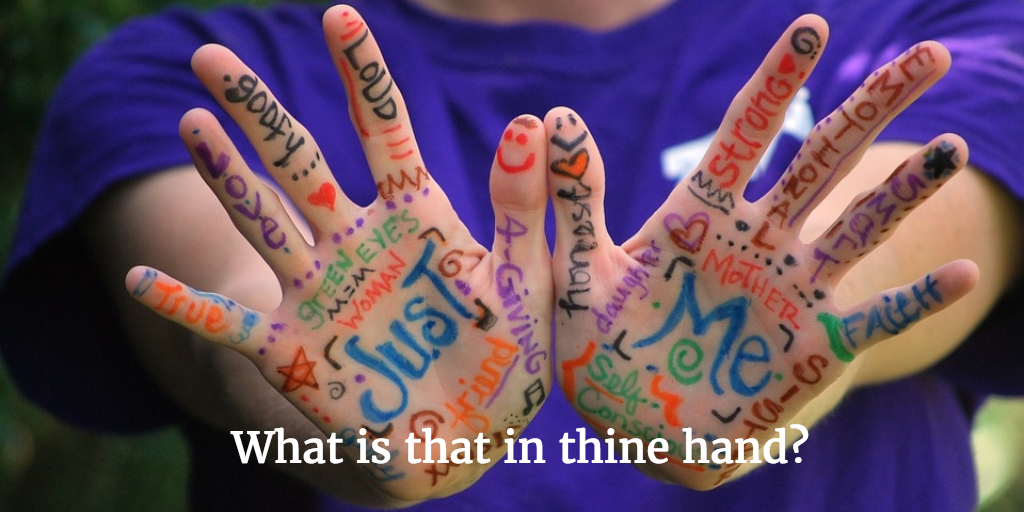“What is that in thine hand?”
When I read this phrase in Exodus 4, I always picture Moses with a strange expression on his face as he glances toward his hand. Here he stands, face to face with the all-knowing God of the universe, and He’s asking what’s in his hand? It’s a stick! A stick! Who cares that he has a stick in his hand? He’s a shepherd in the wilderness, climbing mountains and guiding sheep. The stick is nothing more than a tool of his trade. …Or is it? Why is the God of the universe so interested in that stick?
Because He plans to use it.

Two weeks ago, we sent out a challenge, which we originally intended to finish up today. We haven’t seen a lot of response, and we have struggled ourselves in getting in all the conversations we want to have. So we’re going to extend our challenge to sit down with a single parent, a foster parent, or a non-parental guardian and learn from them. But we’re also going to bring in the next Growing Together challenge so you can be thinking about it as you learn.
Often, we think of ministry to orphans or the fatherless in terms of orphanages, food programs, clothing programs, educational programs, and basically anything to which you can attach the word “program.” That perspective from my vantage point, and probably yours, is overwhelming. But nowhere in the Bible does God require this of us. Are those things unbiblical? No, but God does not require that every Christian start an orphanage in his backyard. This would be not only unrealistic but also a weight heavier than we could bear. God’s plan is much less extravagant than this, perhaps so much so that we miss it for what it really is.
There stood Moses with that rod—that stick. To him it was nothing more than a piece of wood that came in handy in his daily work. But God had a plan for that rod. He would use that rod to show His power to the people of Israel as well as to the Egyptians. He would use that rod to deliver Israel at the Red Sea. He would use that rod to provide water in the wilderness. God had big plans for that stick.
Moses had used the stick in his hand day after day for menial, mundane tasks. To him it was just a part of who he was and what he did. He probably never saw any value in it other than what he personally got out of it. He probably never saw that God could use it to guide, protect, and help others.
But God uses small things. He used the donkey’s jawbone in Samson’s hand to kill a thousand men. He used five smooth stone’s in David’s hand to deliver Israel from the oppression of their enemy. He used the widow’s handful of flour and a little bit of oil to feed a starving prophet. He used a cloud the size of a man’s hand to end a drought. He used the five small loaves and two fish in the hand of the child to feed the multitudes.
God does not ask us, “What is in that man’s hand?” He asks us, “What is in thine hand?” That is all He requires of us.
A couple of years ago, as I was looking back on the path down which God has led this ministry, I began to see a pattern. The things that were most effective were not massive programs. They were simple solutions to vital needs. Since then, that has become our mode of operation.
We cannot feed every fatherless child in Billings, nor is that our goal. But we can take what God puts in our hand and use it as He directs us. Maybe that thing in our hand is counsel. Maybe it is know-how in changing a taillight. Maybe it is a professional network that knows where to get a needed resource. Maybe it is experience in setting up a new business or in business development. Maybe it is cooking experience, cleaning experience, yard and garden experience, desktop publishing experience, or GED preparation experience. Maybe it’s parenting experience. Maybe—it’s just me. Maybe just being who I am and letting God be Himself through me in loving the fatherless and those caring for them is all that is required.
This week’s challenge is simply to take stock. What has God put in your hand? What skills do you have that could help meet the needs you have discovered or are discovering as you learn from single parents, foster parents, and non-parental guardians? Think it through. Write things down. Commit those things to God’s use. And be watching, because we’re going to be asking on Facebook. The things you discover may give us ideas that we had never thought of before!
Don’t miss a thing!
We would love to keep you up-to-date with what is going on at FTN. If you haven’t already, please subscribe to our email list. You’ll also receive this free introductory ebook, Of Swords and Promises. By entering your email and clicking “Sign up” you are agreeing to receive updates, including our most recent blogs, and occasionally resources, which we hope will be a blessing to you in reaching out to the fatherless in your sphere of influence. Please check your inbox for an email to complete the sign up process. Thank you!
You can change your mind at any time by clicking the unsubscribe link in the footer of any email you receive from us, or by contacting us at rmiller@forbidthemnot.com. We understand the importance of your privacy and will never sell, rent, or trade email lists. You can see our full Privacy Policy here.
By clicking above, you agree that we may process your information in accordance with these terms.









